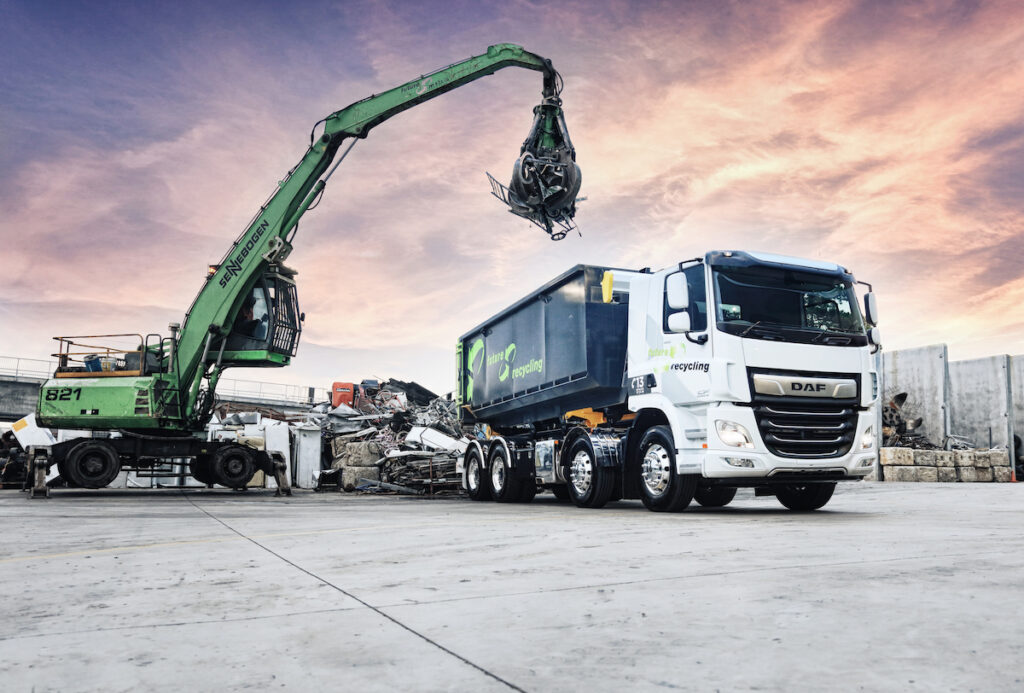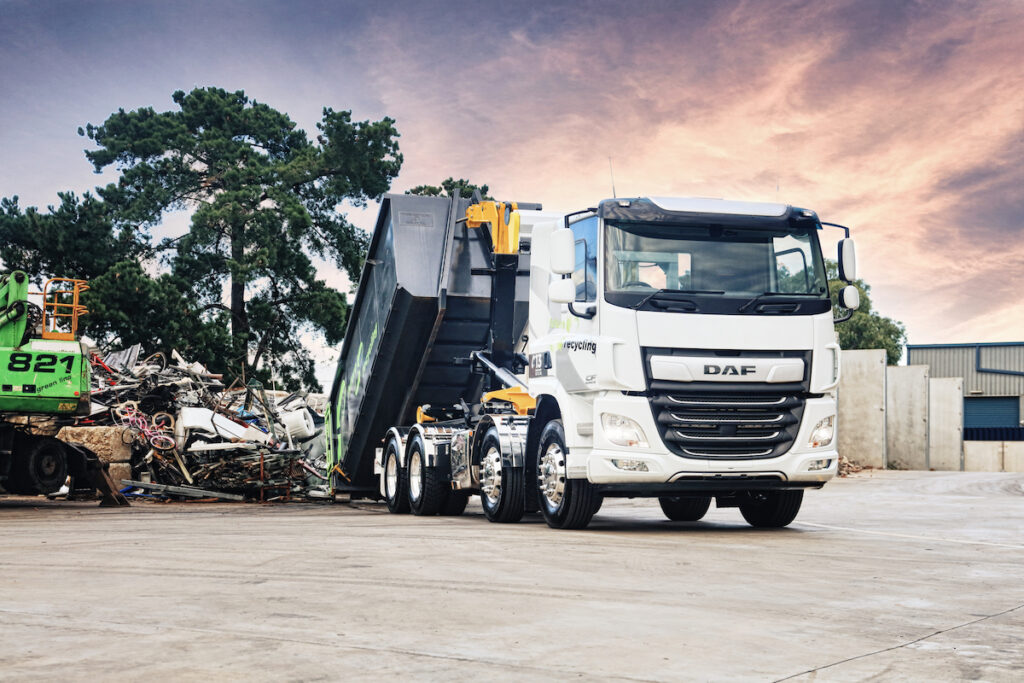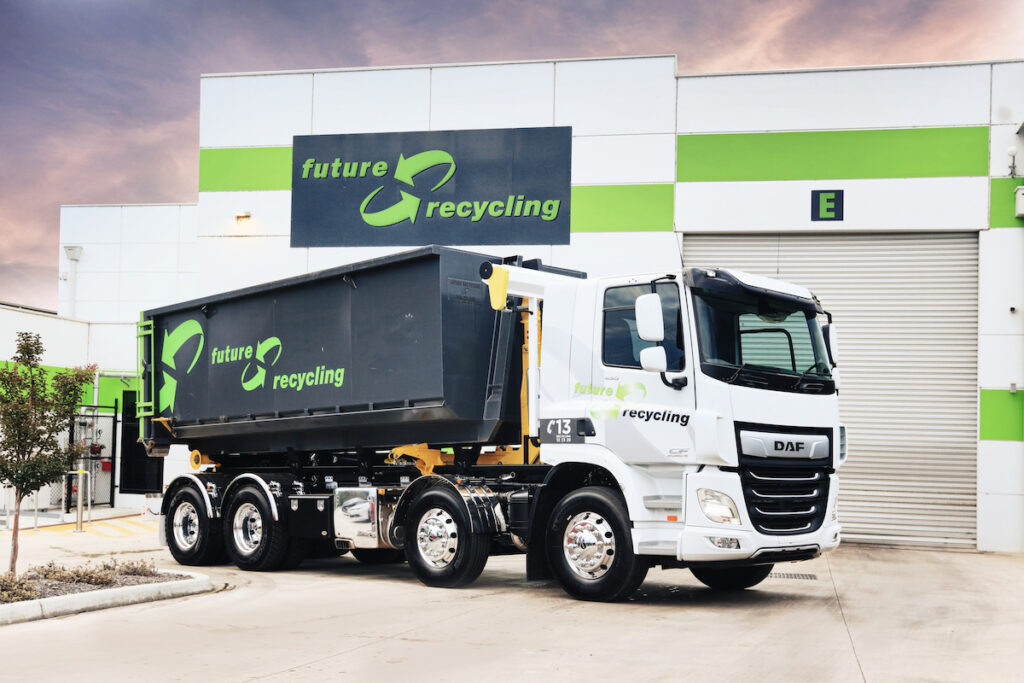A growing fleet for a growing business

In 2016 Future Metals Recycling was renamed to Future Recycling and from there the company came into its own. Having diversified its portfolio, which had originally been in metal recycling dating back to 2008, to include waste and cardboard recycling collection services, the business helmed by Tyrone Landsman, who became the sole owner in 2018, has gone from strength to strength.
Growth has since then been something of a habitual vein of constancy. In 2016 the business purchased a transfer station in Pakenham. After major capital investment, the facility was upgraded significantly.
By 2019, the business had commenced the upgrading of the Hallam Transfer Station facility where the team accepts scrap metal, materials for recycling and waste.
In 2023 Future Recycling was successfully awarded a major contract with the City of Bayside.
The 20-year contract is to manage and operate a Cheltenham-based site on the basis that it is upgraded to a standard equal to that of their Pakenham and Hallam facilities.
The entire site, subsequently, is being redeveloped and will include undercover shelter, a large hardstand area, and a recently completed first stage that makes it compatible for the State Government Container Deposit Scheme (CDS) refund program. In the last year alone, the business has grown by 30 per cent.
With that, Future Recycling has had to bring in additional vehicles to bolster the fleet. In 2021 it introduced the first two of the new Euro 6 DAF CF450s.
They have performed very well over the past three years prompting the purchase of two more, one of which an owner-driver has already taken on according to Tony Black, Waste and Logistics Manager.
“For manoeuvrability they’re absolutely fine,” he says. “The DAFs are easily getting into all our customer sites and transfer stations. The day cab spec works well in and out of our facilities and there’s good vision for the driver.”
Driver visibility when loading and unloading bulk bins is paramount to a safe working environment. The new hook-lift 8x4s have a maximum payload of 27.5 tonnes.
They are powered by the PACCAR MX-11 engine. Fuel efficiency compares favourably to the best-running trucks in the fleet. The remit of its operations is to extract as much recyclable and reusable material as possible to reduce waste going to landfill.
Future Recycling diverts up to 70 per cent of waste to recycling. Materials that can be reused are separated for resale.
As the trucks are predominantly transporting bulk bins, in any given day they can go from a VISY recycling facility to a CDS recycling facility to one of several scrap sites to a scrap customer to a waste customer to landfill, where the diff locks on the vehicle customarily come into play.

Future Recycling doesn’t always rely on set runs for set trucks with some sites being time critical. “We can change drivers runs at any time of any day,” explains Tony.
“It’s about having a truck that provides the autonomy to make the required changes and run our business efficiently that enables us to continually improve our productivity and most importantly our customer service.”
Future Recycling provides full resource recovery, bin delivery, regular bulk bin changeovers and removals. The trucks, accordingly, are double shifted. They can average between 18 and 20 hours a day.
This is a practice that is becoming more prevalent over the business as its ascendant growth continues so it can meet the service needs of customers according to Tony.
“The double shifts underscore the importance of having fixed contract maintenance on these trucks and also being able to have a partner that operates 24/7 where we can take the trucks after hours,” he says.
The relationship with Hallam Truck Centre from a previous role of Tony’s has proven fruitful and long-term.
“When we came out of COVID we needed trucks and we needed them quickly like everybody did and Hallam Trucks provided the lifeline we needed,” Tony recalls.
“They provided us two trucks within six weeks. That was part of having a good relationship and it certainly helps.”
The new management structure at Hallam Truck Centre also fits with the duty cycles now inherent in Future Recycling’s operations.
“We’ve been really happy in how they service the vehicles after hours and that’s encouraged us with their contract maintenance,” says Tony.
“They’ve also provided us with a new contract maintenance slant which drove us towards having that relationship where we want to operate the vehicles, however the maintenance side, which is not our skillset, we want to have a partner like DAF that can service and provide us with the backup we need to continue to keep our fleet moving.”
Between the trucks primarily servicing recycling contracts for VISY and the CDS ‘Return-It’ program each night, daylight hours are mainly dedicated to scrap steel work.
While the bulk bin application is mostly uniform, with new 23m3 and 31m3 containers purchased for the ‘Return-It’ account, there’s a diversity of industry segments the DAFs work across.
The partnership with DAF, however, is not newly forged. The first trucks in the fleet, going back to when the business started out in Shepparton in 2008, were purchased from DAF.
In fact, one of the original vehicles, after a $25,000 refurbish, was returned to the fold. That truck is now approaching nearly one million kilometres.
“It has been a reliable and hard-working truck although now in semi-retirement it’s mainly used nowadays as a spare,” says Tony. “It’s done its job well, safely, and efficiently. That’s an indication of how well Future Recycling and Hallam Truck Centre have maintained the vehicle.”
When Tony joined the company in 2017 the fleet, which now consists of 30 vehicles, was relatively small.
Future Recycling also runs semi-tippers and six walking floors for the transfer stations with tray trucks also making up a small part of the growing fleet.
The company is Certified Carbon Neutral by Climate Active. That leaves little room for leniency in its maintenance procedures. Driver and fleet safety along with Chain of responsibility is taken very seriously.
“That’s one of the reasons why we’re constantly updating our fleet,” says Tony. Truck OEMs are also continually updating their product.
For operators and fleet management that can sometimes be problematic when too many changes are made.
Not so with the new generation DAFs where a familiarity in the interior design has carried over.
That shouldn’t be underestimated according to Tony, who has seen first-hand the difficulty some drivers can have in adapting to too many changes in a vehicle’s operational profile.
“When I drove the new DAF to our truck depot, I looked through the cabin and thought they haven’t changed the outlay in the cab to any great extent,” he says. “Modernised it, sure. The layout has remained driver friendly and quite easy to drive.”
Over a recent period, many OEMs tended to a vogue of extra trick gauges and microswitches.
From his perspective, when teaching the merits of conservative engine braking and the effectiveness of using a retarder for fuel economy and braking is taking precedence, less is more for Tony.
“It’s very important for us to have a truck that you can work easily with and can rely on every time you sit in the cab,” he says. “Our DAFs have definitely been that so far. After three years we have had no issues with them at all.”

Written by William Craske
First published in Prime Mover magazine April 9, 2024
Comments are closed.